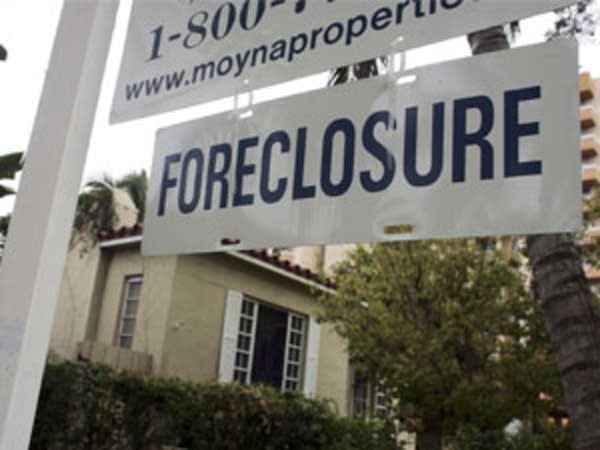Predatory lending law causes headaches for some home buyers

It's early Monday morning and Michael Schaffer is getting ready for work along with his wife, Leah Holmgren. The two own a townhouse in Woodbury that they share with two energetic and inquisitive Italian greyhounds.
The newlyweds have lived in their townhouse since 2005, but now think it's time to upgrade to a larger space.
"We have outgrown our space, and we need a larger home in order to function in our daily lives," Holmgren said.

Holmgren and Schaffer have dreams of building a home with an extra bedroom, plus an office for Schaffer's growing accounting and tax practice. But there's just one problem. They can't get a loan because Schaffer is self-employed.
Create a More Connected Minnesota
MPR News is your trusted resource for the news you need. With your support, MPR News brings accessible, courageous journalism and authentic conversation to everyone - free of paywalls and barriers. Your gift makes a difference.
"I don't get a paycheck that is same amount every two weeks," Schaffer said. "So it's hard for them to verify the amount of money that I make every year."
Schaffer isn't alone. Minnesota Public Radio News has talked to several real estate agents and mortgage brokers who say the new predatory lending law is making it more difficult for people who are self-employed to get loans.
Here's why. Minnesota's predatory lending law eliminated a large number of high-risk loans. The law was designed to stop mortgage brokers from making loans that require little or no documentation of a home buyer's income and assets.
Mortgage brokers used to offer loans like that to self-employed people because they don't get a standard paycheck. The new law cracked down on those loans, because some mortgage brokers were making large loans to people who couldn't afford to pay them back.
"Everybody says 'We love small business' and 'small business is what drives America.' They can't say that in one breath and in the other breath cut off your access to credit."
Minnesota Mortgage Association President Tim Bendel said because the law is relatively new, he doesn't know the extent of the problem. But he said it may be removing prospective buyers from a struggling housing market.
"This is a fairly small percentage of the total pie of loans that are out there," Bendel said. "But if it's 5 percent, that's 5 percent of the loans that we could have done a few months ago in the total market, that we won't be able to do going forward. And in my view, part of this market getting better is clearing inventory and selling homes."
Bendel said some aspects of the new law were needed to remove unscrupulous mortgage brokers from the market. But he said he'd like to see a portion of the law changed so mortgage brokers can offer loans only to self-employed people who have good credit, a good earnings history and who can make a significant down payment.
Lawmakers who pushed for the predatory lending law say they don't want to change it.
"The work that we've been doing over the interim, especially on foreclosure issues, shows that we shouldn't be going backwards on this," Sen. Linda Higgins, DFL-Minneapolis, said. "It's only been in effect since Aug. 1."
Higgins has been adamant about cracking down on predatory lending because a large number of foreclosures have occurred in her district in north Minneapolis. It's so bad that Higgins has a map of the foreclosures on her office wall.
Higgins said legislators were careful to put safeguards in the law to protect the self-employed. She said mortgage brokers can verify people's income by using tax returns, and the average income of their businesses over several years.

"If they look at it with clear eyes, they can be thinking about some nontraditional ways to verify it and use those nontraditional ways," Higgins said. "I hesitate to say 'creative,' because part of 'creative' is what got us into the trouble that we're in -- because people got too creative."
Self-employed folks can also apply for loans at federally chartered banks, since they are exempt from state laws. But a tight mortgage market has made that difficult.
Other backers of the law also don't see a problem. Rep. Joe Mullery, DFL-Minneapolis, said he hasn't heard concerns about the new law. When told that some real estate agents, mortgage brokers and others are struggling with it, Mullery said he wanted to see statistics.
Mullery said mortgage brokers and real estate agents are complaining because they don't like the new law.
"I think they want to push as much as they can to get the law back to where it was, so they can make huge amounts of money on questionable loans," Mullery said.
Back at their townhouse, Schaffer and Holmgren say they'll continue to examine their options. Schaffer says they've thought of rent-to-own programs or waiting until the foreclosure problem eases a bit. Until then, Schaffer said they're frustrated by their lack of options.
"Everybody says 'we love small business' and 'small business is what drives America,'" Schaffer said. "They can't say that in one breath, and in the other breath cut off your access to credit. Because part of owning a small business is that sometimes you have a phenomenal year and other times you don't have a phenomenal year."
A spokeswoman from the Minnesota Housing Finance Agency said her office will monitor the situation to see if problems with the law become more widespread.
